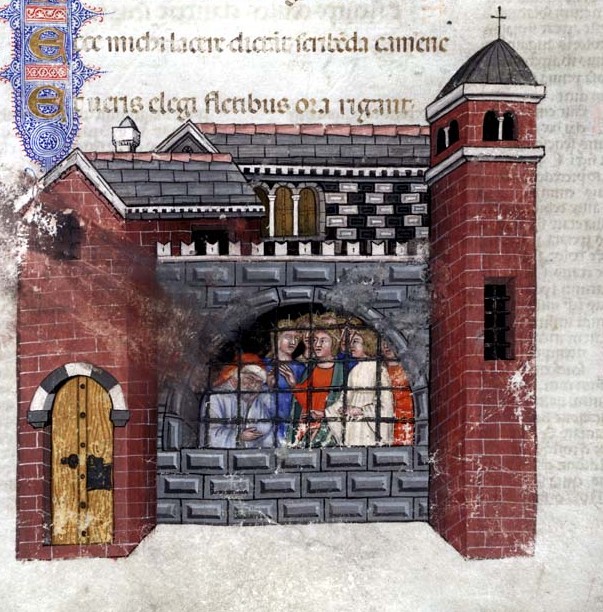
Boethius in better days, as imagined almost a millennium after his execution.
You think you have it bad, huh? All you are dealing with is a worldwide plague that won’t let up, financial catastrophes one after another, and cabin fever from enforced confinement.
Try living at the nasty tail-end of the Roman Empire, when the barbarians were taking over, and then being thrown into prison by the Ostrogoth Emperor Theodoric for doing nothing at all, really. Then imagine having more of nothing to do, except write, while awaiting a grisly execution. Welcome to the world of Boethius (c. 476-524 A.D.), author of the The Consolation of Philosophy, a bestseller throughout Europe for almost a millennium. According to John Marenbon writing in “Why Read Boethius Today?” over at Aeon: “Although Aristotle’s texts shaped the university curriculum, and Augustine’s thought was ubiquitous, in the period from 800 until about 1600 no other philosophical text could compete with the Consolation in its appeal – not just to the intellectual elite but to a much wider audience too.” How did it disappear from our public conversation, unlike Plato’s dialogues or René Descartes’s Meditations?
Some background from the Aeon article:
Boethius belonged to a rich, prestigious Roman family, and he lived most of his life enjoying the privileges of his class, participating in the ceremonies of the Senate, writing works and commentaries on mathematics, music and logic with the help of his education in Greek culture, and, though not a priest, taking part in theological controversies. But his birth had coincided with the beginning of Ostrogothic rule in Italy. Theodoric, the Gothic king, wanted good relations with the native Roman aristocrats, but they remained a threat to him. In the early 520s, he invited Boethius to become Master of Offices, his most important official. Boethius accepted, but his determination to root out corruption soon made him enemies, and Theodoric was willing to believe that Boethius was plotting against him. Found guilty of treason and other charges, Boethius was imprisoned, awaiting execution. This was when he wrote the Consolation, with his own circumstances as a condemned prisoner providing the setting.

Kind of a writer’s retreat, without the swag bags.
The work is a dialogue between Boethius the Prisoner and a personification of Philosophy, in the shape of a beautiful woman who appears to him in his cell. The discussion is in prose, but it is interspersed with poems that summarise, comment on, take forward or provide another perspective to, the main line of the argument.
At the beginning, Boethius the Prisoner can do nothing but lament his sudden fall from prosperity and explain at length to Philosophy the injustice of the charges against him. Philosophy is not at all sympathetic. She tells him that, if he remembered her teachings, he wouldn’t be complaining, as he does, that God has no concern for humans, and that the good suffer and the wicked prosper. She sets out to answer both charges.
Another excerpt:
On a straightforward reading of the Consolation, Philosophy’s argument is taken as authoritative, accepted by both Boethius the Prisoner and by the author. If so, the Consolation, like Plato’s dialogues on Socrates’s execution, is a bold assertion of the power of unaided human reason even in the face of death. But – and the same objection might be made to Plato’s Phaedo – the central philosophical arguments are likely to seem too weak, especially to modern readers, to support such a claim. There is, however, reason to think that this straightforward reading doesn’t do the Consolation justice.
Ancient readers were very conscious of a work’s genre. It guided their expectations of how its author intended it to be understood. By writing the Consolation in alternating prose and verse, Boethius signalled that the work is a Menippean satire. As Joel Relihan showed in Ancient Menippean Satire (1993), this genre of satire ridicules figures of authority. Readers of the Consolation might therefore expect Philosophy’s teachings not to be treated with complete respect. From this starting point, Relihan develops in The Prisoner’s Philosophy (2007) a reading that is diametrically opposed to the straightforward one. Philosophy, he argues, is shown as failing to provide the Prisoner with consolation, and this failure was Boethius’s way of revealing the weakness of any sort of human reasoning. The implicit message is that Christian faith alone provides the type of consolation that Boethius the Prisoner was wrongly seeking from Philosophy.
Such a reading treats all the Consolation’s philosophical argumentation as if it were mere rhetoric, devised by Boethius the author just in order to show its inadequacy, with its main message delivered by indirect means. This is hard to accept. Would Boethius, who had devoted his life to philosophy, really have treated arguments in this way? Why, in particular, elaborate the intricate argument at the end of the work about divine prescience and contingency, certainly his finest and most original piece of reasoning, if his purpose were just to show the inadequacy of philosophy and not its power to console?
Read the whole thing here.
Tags: Boethius, John Marenbon

